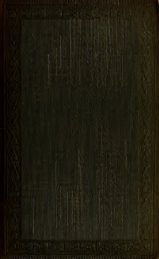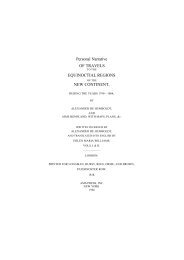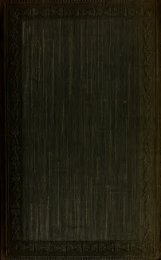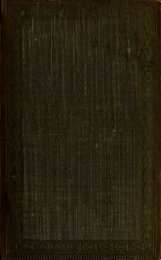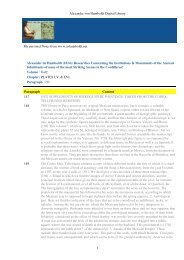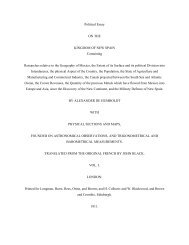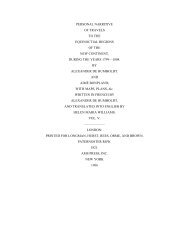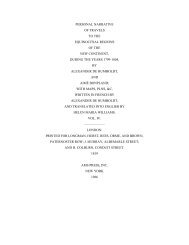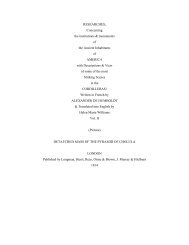See the complete document here
See the complete document here
See the complete document here
Create successful ePaper yourself
Turn your PDF publications into a flip-book with our unique Google optimized e-Paper software.
PHYSICAL CONTExMPLATloN OF THE UNI /ERSE. 109<br />
opraent of our experimental sciences. The liist()ry of <strong>the</strong> contemplation<br />
of <strong>the</strong> universe, as I its<br />
interpret limits, designates<br />
not so much <strong>the</strong> frequently-recurring<br />
oscillations between truth<br />
and error, as <strong>the</strong> principal epochs of <strong>the</strong> gradual approximation<br />
to more accurate views regarding terrestrial forces and<br />
<strong>the</strong> planetary system. It shows us that <strong>the</strong> Pythagoreans,<br />
according to <strong>the</strong> report of Philolaiis of Croton, taught <strong>the</strong> progressive<br />
movement of <strong>the</strong> non-rotating Earth, its revolution<br />
round <strong>the</strong> focus of <strong>the</strong> world (<strong>the</strong> central fire, hestia), while<br />
Plato and Aristotle imagined that <strong>the</strong> Earth nei<strong>the</strong>r rotated<br />
nor advanced in space, but that, fix 3d to one central it<br />
point,<br />
merely oscillated from side to side. Hicetas of Syracuse, who<br />
must, at least, have preceded Theophrastus, Heraclides Ponticus,<br />
and Ecphantus, all appear to have had a knowledge of <strong>the</strong><br />
rotation of <strong>the</strong> Earth on its axis ; but Aristarchus of Samos,<br />
and more particularly Seleucus of Babylon, who lived one<br />
hundred and fifty years after Alexander, first arrived at <strong>the</strong><br />
knowledge that <strong>the</strong> Earth not only rotated ou its own axis,<br />
but also moved round <strong>the</strong> Sun as <strong>the</strong> center of <strong>the</strong> whole planetary<br />
system. And if, in <strong>the</strong> dark period of <strong>the</strong> Middle Ages,<br />
Christian fanaticism, and <strong>the</strong> lingering influence of <strong>the</strong> Ptolemaic<br />
school, revived a belief in <strong>the</strong> immobility of <strong>the</strong> Earth,<br />
and if, in <strong>the</strong> hypo<strong>the</strong>sis of <strong>the</strong> Alexandrian, Cosmas Indico-<br />
assumed <strong>the</strong> form of <strong>the</strong> disk of<br />
pleustes, <strong>the</strong> globe again<br />
Thales, it must not be forgotten that a German cardinal,<br />
Nicholas de Cuss, was <strong>the</strong> first who had <strong>the</strong> courage and <strong>the</strong><br />
independence of mind again to ascribe to our planet, almost<br />
a hundred years before Copernicus, both rotation on its axis<br />
and translation in space. After Copernicus, <strong>the</strong> doctrines of<br />
Tycho Brahe gave a retrograde movement to science, although<br />
this was only of short duration and when once a ;<br />
large mass<br />
of accurate observations had been collected, to which Tycho<br />
Brahe himself contributed largely, a correct view of <strong>the</strong> struc-<br />
ture of <strong>the</strong> universe could not fail to be speedily established.<br />
We have already shown how a period of fluctuations between<br />
truth and error is especially one of presentiments and fanciful<br />
hypo<strong>the</strong>ses regarding natural philosophy.<br />
After treating of <strong>the</strong> extended knowledge of nature as a simultaneous<br />
consequence of direct observations and ideal com-<br />
binations, we have proceeded to <strong>the</strong> consideration of those historical<br />
events which have materially extended <strong>the</strong> horizon of<br />
<strong>the</strong> physical contemplation of <strong>the</strong> universe. To <strong>the</strong>se belong<br />
migrations of races, voyages of discovery, and military expeditions.<br />
Events of this nature have been <strong>the</strong> means of ao



